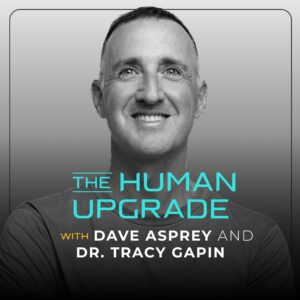
Could your genes and stress be related? Is stress passed down from generation to generation?
Recent research shows that stress may alter our genes in a way that’s linked to mental and physical illnesses. These stress-induced illnesses may even be hereditary, meaning the trauma of our ancestors impacts our contemporary genetic expression.
How is stress related to your genes? Why is stress such a problem for health?
And what can you do about it to take control of your health?
What is stress?
What’s the first thing you think of when you think of “stress?”
Maybe you instantly think of a project you’re working on at your job or a loan you’re trying to pay off. You may even think of public speaking or skydiving.
Interestingly, when we think of “stress,” we automatically think of situations. We think of instances where our bodies are stressed. These are uncomfortable or challenging situations that push our bodies and brains to new places.
These situations cause us “stress.”
In reality, though, stress itself is a response to these situations.
When these situations occur, our bodies release stress hormones called glucocorticoids. The principal glucocorticoid is cortisol, otherwise called “the stress hormone.”
There are two types of stress: acute and chronic.
Acute stress
Acute stress occurs in the short-term. This is when you’re met with a challenging situation that you have to respond to in some way. To overcome this stressor, your body releases a burst of glucocorticoids.
Glucocorticoids prepare your body to tackle the stressor. For example, your heart might start pumping blood faster to give your body more oxygen; your eyes might dilate to see more around you, and your hands and feet might tingle because they’re receiving more blood (in case you need to fight or flee).
These stress responses are often dubbed as symptoms of “anxiety.” But in the short-term, these hormones can actually give us a biological advantage. For example, they would allow us to fight or flee a bear we come in contact with. In more practical terms today, this response could also make us more alert and energized to give a speech or take a test.
In short spurts, glucocorticoids are manageable and healthy. They can help you tackle a situation with confidence and determination.
It’s when glucocorticoids flood our bloodstream for an extended period of time that they become an issue.

Chronic stress
Chronic stress is long-term. This is caused generally by ongoing stressful situations, like a career you hate, a debt you can’t pay, or an ongoing divorce. Chronic stress can also be the result of PTSD. Even if you aren’t currently going through the stressor, memories of that trauma can continue releasing glucocorticoids for months or years.
Chronic stress causes high levels of stress hormones for an extended period of time. This damages the endocrine system by unbalancing hormones, tiring the body, and fatiguing organ function.
In fact, chronic stress can even negatively impact your genetic expression.
Moreover, this altered gene expression can be passed down from generation-to-generation.
Before we get into how chronic stress alters epigenetic expression, let’s first take a look at why stress is bad for us.
Why is stress harmful?
Stress kills. Stress has been linked to:
- Chronic inflammation
- Allergies
- Ulcers
- Depression
- Schizophrenia
- Cancer
- Obesity
- Hypertension/high blood pressure
- Cardiovascular disease
Chronic stress can literally burn out your body. Your adrenal glands, which produce cortisol, get fatigued and don’t function properly. The oxidative stress caused by these stressors creates harmful free radicals that severely damage your cells. This accelerates the aging process, damages the immune system, and impacts cognitive function.
Stress is linked to just about every disease—big or small. You’re even more likely to catch a common cold if you’re stressed.
Cortisol and testosterone
Stress also has a direct impact on your sexual health.
If you’re suffering from low libido and low testosterone, it may be because you’re stressed.
Numerous studies have shown that high levels of cortisol are directly linked to low levels of testosterone. There is especially a link between stress and severe trauma with PTSD. Higher cortisol in stressful situations drastically lowers testosterone.
When your cortisol goes up, your testosterone goes down.

Why does higher cortisol mean lower testosterone?
There are likely a number of hormonal pathways that create this hormonal relationship. To simplify it, we can look at the building blocks of cortisol and testosterone synthesis.
The body uses cholesterol to produce cortisol. Cholesterol is also a necessary part of testosterone synthesis. When stress levels increase, all of your body’s cholesterol goes to produce cortisol. This leaves no cholesterol left to produce testosterone.
Testosterone is a critical hormone in healthy adult males. Low testosterone is associated with decreased sex drive, erectile dysfunction, depression, anxiety, weight gain, reduced muscle mass, cognitive impairment, arthritis, increased risk of heart disease, and more.
Low levels of testosterone kill your energy, productivity, enjoyment, and health. And low levels of T are a direct result of high cortisol and high stress.
Chronic stress not only impacts our hormones but also our genes. High levels of cortisol and low levels of testosterone can alter the way our DNA is expressed, putting us at risk for disease and illness.
How does stress alter your epigenetic expression?
Epigenetics involves two key genetic alterations: DNA methylation and histone acetylation. DNA methylation adds a methyl group to the end of a DNA structure, and histone acetylation adds an acetyl to the end of the histone binding. These additions can either activate or deactivate certain genes.
Research has shown that stress causes both methylation and acetylation on a variety of genes, especially neurological genes (those in the brain).
DNA methylation and stress
One study found that certain psychological stressors can cause DNA methylation of certain genes. For example, war trauma and physical abuse caused DNA methylation to occur on genes that activate damaging psychiatric disorders.
A study of Cushing’s Syndrome, which is caused by excess cortisol production, found genome-wide changes with regards to DNA methylation. They discovered that individuals with high cortisol levels had less DNA methylation compared to healthy individuals.

DNA methylation suppresses the expression of genes. In this way, certain harmful genetic expressions need DNA methylation in order to be suppressed. For example, in the study, the gene for psychiatric issues remained active because stress kept those genes “turned on;” this caused a number of CS patients to suffer from mental illness at a higher rate.
Research at Johns Hopkins found that mice given corticosterone appeared more anxious during a maze test. When testing their gene methylation levels, they found altered expressions in three of the five HPA axis genes.
They especially found higher levels of Fkbp5, which is the molecular complex that interacts with the glucocorticoid receptor. Genetic variations in Fkbp5 have previously been associated with PTSD and mood disorders.

Overall stress and genes
Basically, stress boosts cortisol and other glucocorticoids. These hormones impact histone coding and DNA methylation, activating genes of illness while deactivating healthy-suppressive genes.
Stress also plays an important role in those genes that control memory and cognitive function. Too much cortisol and these genes “turn off,” causing serious psychological and behavioral concerns.
Glucocorticoids, like the stress hormone cortisol, alter the genetic expression in the brain. Thus, any cortisol-boosting situation—like anxiety, PTSD, depression, and stress—can impact epigenetic chemical tags.
Thus, prolonged stress causes significant epigenetic changes that can drastically impact mental and physical wellbeing.
Stress doesn’t just alter your own genes. These epigenetic expressions and psychological concerns can be passed on for generations as well…
How does stress impact your children’s genes?
That’s right. You can pass your stress on to your children.
Studies have shown that environmental conditions of previous generations impact the expression of our current genes as well.

For example, one study found that daughters of women who experienced the Dutch famine were twice as likely to develop schizophrenia. The daughters did not go through the famine themselves, but their mother’s trauma was genetically passed down, increasing the offspring’s risk of mental illness.
Other studies have shown that extreme stress during pregnancy, like living through the 9/11 attacks, can pass the experience on to the child. These children report depression, anxiety, and poor coping mechanisms at a much higher rate than parents who did not live through extreme stress.
This is true even when the children are well cared for. A study of rats found that parents who experienced epigenetic-altering stress passed this genetic structure on to their pups and grand pups—even if they’re pups were cared for and loved in early life.
Although these altered genetic expressions are hereditary, they’re not permanent.
In fact, you can reverse stress-related DNA changes with environmental and lifestyle factors.
A study of identical twins looked at how environment and trauma impacted epigenetic flags. Although the siblings were genetically identical, their epigenetics changed over time. One twin had depression, anxiety, and obesity while the other did not. This is likely because the latter twin was able to change his epigenetics in a way that suppressed the genes for those diseases.
We have power over our epigenetics.
You can deactivate the stress-related genetic expression that you may have inherited from your family.
And you can prevent the activation of your own stress-induced DNA methylation.
How can you reverse stress-induced genetic risk factors?
-
Meditate.
One of the easiest and most effective ways to combat high stress is through meditation. Relaxation practices have been shown to reduce cortisol and increase testosterone. In fact, even just four months of meditation practice can help reset hormone levels and improve stress response.
I recommend taking a yoga class and learning deep breathing exercises. You should also get outside to meditate and relax. Studies show that taking a walk in nature is linked to lower cortisol levels. Fresh air helps calm the mind and body—and gets you to exercise as well.

-
Workout.
Working out has a direct impact on mood and cortisol. Working out releases endorphins, which makes you happier and less stressed.
High-intensity interval training boosts testosterone and decreases cortisol. Learn more about using HIIT to lower cortisol and increase T here.
This decrease in cortisol has actually been shown to boost cognitive function and improve behavior and mood.
However, if you have high levels of stress, an intense workout might worsen the problem by boosting cortisol in the short-term. This cortisol increase isn’t harmful to your genes, but it can increase levels of anxiety and tension in individuals already experiencing high levels of stress.
Plus, losing weight and fat can help reduce stress. Moreover, body fat increases estrogen, which decreases T levels. This causes lower testosterone, and low T, in turn, leads to increased body fat and reduced muscle mass—which further impacts stress. It becomes an unhealthy cycle of weight gain, low T, and stress!
-
Eat more carbs.
People tend to shy away from carbs because they “make you gain weight.” However, a diet that’s too low in carbs can actually make you gain weight by increasing cortisol levels.
Carbohydrates actually help reduce cortisol levels, especially post-workout.
However, don't go guzzling carbs when you’re stressed, as too many carbs will cause weight gain and this can further increase cortisol and lower testosterone.
It simply means you want to maintain a balance of macronutrients: proteins, fats, and carbs. Studies have shown that higher protein diets lead to high cortisol levels, while a strong ratio of protein to carbs creates the most balanced hormones.
Click to learn more about the dangers of an all-protein diet—and why you need carbs.
-
Get more vitamin C.

Vitamin C has been linked to reduced cortisol production, especially after an intense workout. Vitamin C is also a great testosterone booster.
One study found that vitamin C actually regenerated 58% of damaged testosterone molecules. It also helps with sperm quality, motility, and volume for improved sexual health. Boost your testosterone and you can help reduce your cortisol and stress.
You can find vitamin C in a number of healthy foods, like citrus, guava, red peppers, strawberries, and papaya.
-
Sleep more.
Sleep helps reset your hormone levels, reducing cortisol and increasing testosterone.
In fact, if you don’t sleep enough, your cortisol levels rise astronomically.
Cortisol levels naturally rise slightly in the morning to help us wake up and prepare for the day. In reverse, cortisol drops at night to help us sleep.
However, if your body doesn’t drop cortisol at night, you’ll deal with insomnia and late-night anxiety. You’ll also have increased levels of cortisol in the morning that can cause severe, chronic stress whenever you’re awake.
Sleep is critical to balance hormones, reduce stress, and restore your body’s natural health.
Learn more about how sleep impacts your epigenetics here.
-
Stand in power poses.
Studies have shown that you can increase testosterone by 20% and reduce cortisol by 25% simply by standing in a “power pose” for two minutes. The researchers concluded that you can change your brain and hormonal chemistry through body language and behavior.
Simply pretending to be powerful and stress-free will make you powerful and stress-free!
Conclusion
Stress impacts our behavioral epigenetics. Traumatic experiences in our past—and in our ancestors’ past—can scar our DNA. Although we can inherit stress-induced genetic expressions, we can also reverse this process as well. With certain lifestyle and environmental changes, you can reduce your stress and reset your genetics for a healthier expression.
Are you ready to change your genes?
You’ll learn how to change your environment and lifestyle to reduce your risk of major diseases… and finally, have the energy and health you crave!
Upgrade to Male™ 2.0 – Schedule a Consult!
You’ll get access to a genetic-based report and analysis, along with a private consultation that will put you on track to your ultimate health.
With the Male 2.0 Method, I test your DNA, interpret the results, and create a customized strategy just for you. This plan is specific to YOUR individual genes and lifestyle. It will improve every area of your life, from your health and professional productivity to your overall longevity and total wellbeing. Male 2.0 gives you the actionable tools you need right now. It reveals what you need to customize and design your future limitless self.
Click here to learn more about the lifelong benefits of a personalized genetics consultation and epigenetic coaching program.
Want more tips to optimize your health? Listen to the latest podcasts. Click HERE
I look forward to working with you to take your health goals to the next level.
COMING SOON TO AMAZON
 In Male 2.0™, Dr. Tracy Gapin has turned everything we once thought we knew about men’s health and performance upside down. The old model of how to be “a man” is broken. A man who works himself to death. A man who tries to NOT get sick but isn’t really healthy either. A man who takes a pill for every ill but is never really cured. That was Male 1.0. Now, imagine being THE MAN ─ owning your performance in the bedroom, the weight room, and the boardroom. Living a fully optimized life. Becoming limitless. This is Male 2.0!
In Male 2.0™, Dr. Tracy Gapin has turned everything we once thought we knew about men’s health and performance upside down. The old model of how to be “a man” is broken. A man who works himself to death. A man who tries to NOT get sick but isn’t really healthy either. A man who takes a pill for every ill but is never really cured. That was Male 1.0. Now, imagine being THE MAN ─ owning your performance in the bedroom, the weight room, and the boardroom. Living a fully optimized life. Becoming limitless. This is Male 2.0!
Tracy Gapin, MD, FACS is a board-certified Urologist, Men’s Health Expert, Author, and Professional Speaker. Using state-of-the-art biometric monitoring, nutrition and lifestyle intervention, Dr. Gapin coaches Fortune 500 executives and evolutionary leaders of business, sports medicine, and high performance. He specializes in cutting-edge precision medicine with an emphasis on epigenetics, providing men with a personalized path to optimizing health & performance. www.SmartMensHealth.com








